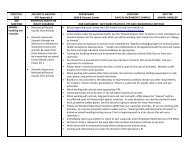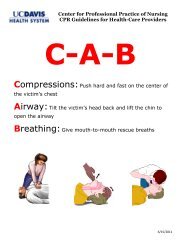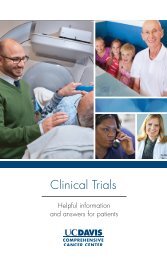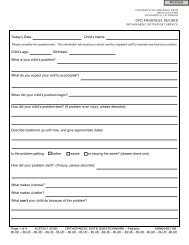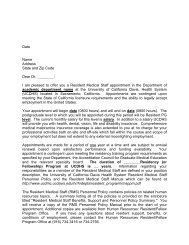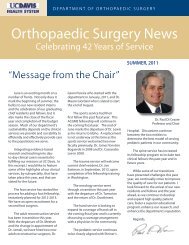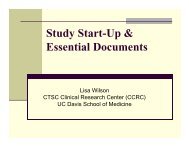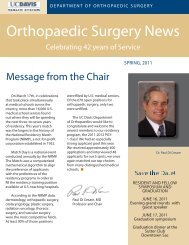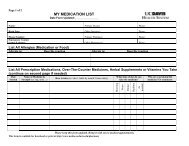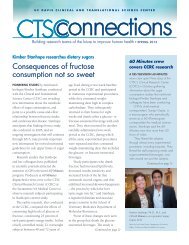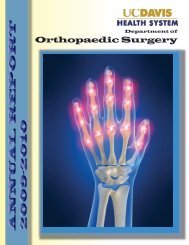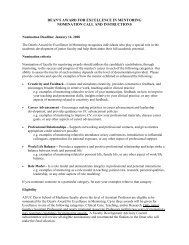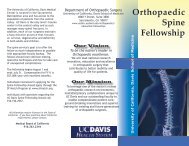Resident Handbook - UC Davis Health System
Resident Handbook - UC Davis Health System
Resident Handbook - UC Davis Health System
- No tags were found...
You also want an ePaper? Increase the reach of your titles
YUMPU automatically turns print PDFs into web optimized ePapers that Google loves.
as physicians, but especially interns. Examples would include the “difficult” patient, death anddying, frustrations and sources of satisfaction as well. The purpose is to develop a forum forsharing and understanding, not correcting or advising! All discussions are held in strictconfidence among the participants.ACGME requires programs to “have formal mechanisms specifically designed for promotion ofphysician well-being and prevention of impairment”. This is accomplished through variousmeans, including academic advisor meetings, monthly meetings involving the residents, programdirector, and clinic staff. <strong>Resident</strong>s also receive training on fatigue, well being, and impairmentduring their Annual Hospital Staff Education and lectures provided by Behavioral ScienceCoordinator, Dan Rubanowitz, PhD. Other regular lectures include Communicating withCompassion (Dr. Lupeika), Progressive Muscle Relaxation / Stress Management (Dr.Rubanowitz) and Dialogue with Duane (informal monthly meetings with program director),The ACGME also requires a structure and facilitated group designed for resident support thatmeets on a regular schedule. For the first year residents, this is accomplished in the regularlyscheduled intern conferences. For second and third year residents, a support group facilitated byDr. Debbie Lupeika, and Dr. Paul <strong>Davis</strong> meets on a regular basis. This group is specificallydesigned for resident support, promotion of physician well being, and prevention of impairment.Dr. Rubanowitz also coordinates an Annual Wellness Screening and Consultation for allresidents. This involves assessing the individual resident’s score on the Professional Quality ofLife Scale, filling out a Wellness and Physician Impairment Prevention check list, andparticipation in facilitated discussions. This occurs on an individual basis in PGY1 and viagroup session during PGY2-3 (with an option for individual sessions).<strong>Resident</strong> wellness is also promoted through Mercy’s Employee Assistance Program (EAP), anexcellent benefit for all Mercy employees. Through the EAP, employees can access freeservices including:• Counseling for marriage and family conflicts, substance abuse, stress management,emotional challenges, health concerns, grief and loss• Childcare referrals• Eldercare referrals• Legal consultation including these areas: landlord/tenant/real estate, custody/visitation,wills/trusts, family law, and more• Financial consultation, including credit issues, retirement planning and moreContacting EAP is confidential which means no personal or identifying information gets back tothe company (Mercy)Mercy provides the EAP to promote early intervention, reduce absenteeism, and show theircommitment to employee wellbeing.The Employee Assistance Program can be accessed by calling: 800 932-0034 or emaileapinfo@acieap.comThe following online PowerPoint has more info:Page 81 of 153C:\Documents and Settings\dhutak\Desktop\rshb13.doc



